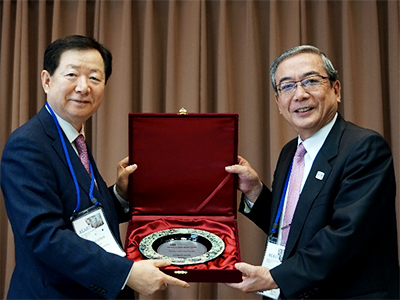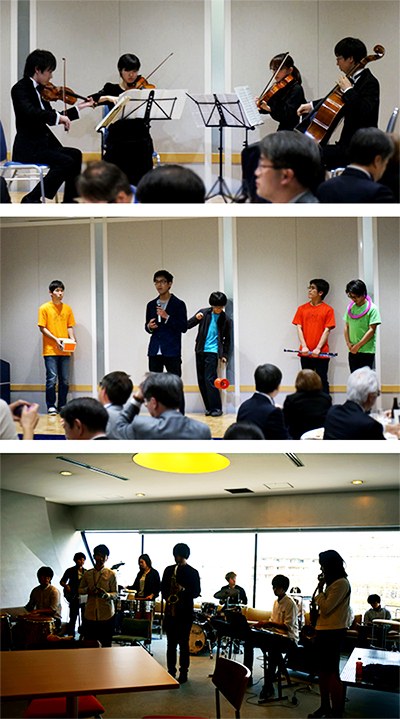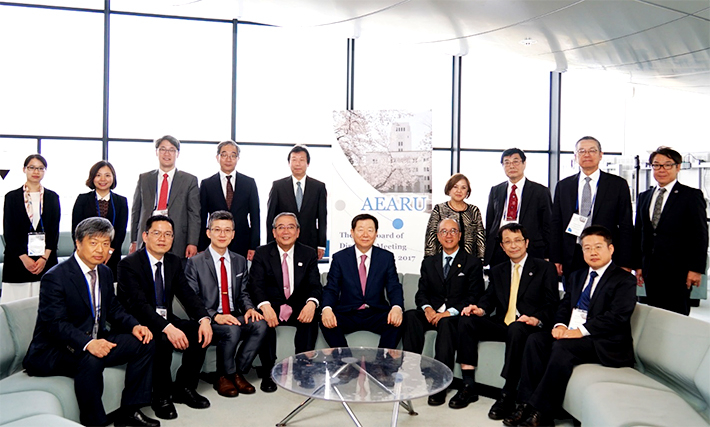Tokyo Tech hosted the Association of East Asian Research Universities' (AEARU)* 40th Board of Directors (BOD) Meeting on April 15.
Opening the meeting, President Yoshinao Mishima noted AEARU's dual missions of enhancing higher education in East Asia and seeking joint solutions to global challenges by fostering exchanges among the region's leading universities. The association pursues these missions through activities that include research workshops, such as the 6th Energy and Environmental Workshop hosted by Tokyo Tech in 2016, and summer camps organized to facilitate development of student networks. "In addition, AEARU's annual general meetings and board of directors' meetings offer valuable opportunities for the presidents and representatives of member universities to come together to exchange ideas and opinions," said Mishima.
A total of 29 representatives from AEARU Board Member universities attended the meeting, including the presidents and/or vice presidents from Seoul National University (AEARU Chair for 2016-17), the University of Tsukuba (Vice-chair for 2016-17), Peking University, Nanjing University, the Hong Kong University of Science and Technology, National Taiwan University, and Tokyo Tech.
President Nak-in Sung of Seoul National University, the current AEARU Chair, led the meeting. Member universities shared reports on AEARU activities in 2017 and exchanged information on upcoming activities.

Presidents Sung (left) and Mishima
As a supplemental activity, the delegates were invited to participate in lab tours highlighting research at Tokyo Tech. Meeting with Professor Hideki Taguchi and Honorary Professor Yoshinori Ohsumi of the Cell Biology Center on Suzukakedai Campus, AEARU members engaged with the 2016 Nobel laureate in Physiology or Medicine in a lively discussion about autophagy and the value of pursuing basic research.

Meeting with Honorary Professor Ohsumi (right)
Professor Hideo Hosono, director of the Materials Research Center for Element Strategy (MCES), introduced the center's research activities and led AEARU delegates on a tour of the facility. Established in 2012 under the national Elements Strategy Initiative, the MCES is designated as one of Tokyo Tech's strategic research hubs. It conducts research aimed to create innovative materials from abundant elements and to promote collaborative research with industry at Suzukakedai Campus. Hosono himself is internationally recognized for his discovery of iron-based superconductors.

Explanation by Professor Hosono (right)

(Top) An ensemble from the Tokyo Institute of Technology Orchestra
(Middle) Jugtech
(Bottom) Los Guaracheros
Performances by Tokyo Tech student groups added vibrancy to the proceedings. AEARU representatives commented on Tokyo Tech students' obvious enjoyment of their campus lives as they balance their studies and research activities with hobbies and other interests.
Performing at the welcome dinner on April 14, an ensemble from the Tokyo Institute of Technology Orchestra played a string quartet by Joseph Haydn.
Members of the Institute's award-winning juggling group, Jugtech, wowed the audience with techniques using batons, rings, and other props.
Los Guaracheros, Tokyo Tech's Latin jazz group, gave lively performances of "Guaracha 42," "Confirmation" and "Spain" at the luncheon following the BOD meeting.
A member of AEARU since shortly after the consortium's establishment, Tokyo Tech's two-year term as a BOD member university will continue through 2017.
* AEARU (The Association of East Asian Research Universities)
Founded in 1996 at the suggestion of HKUST, AEARU was established as a forum for discussion among the presidents of leading research-oriented universities in East Asia with the goal of promoting exchange and cooperation activities between the 18 leading universities in China, Hong Kong, Japan, Korea, and Taiwan.
. Any information published on this site will be valid in relation to Science Tokyo.







